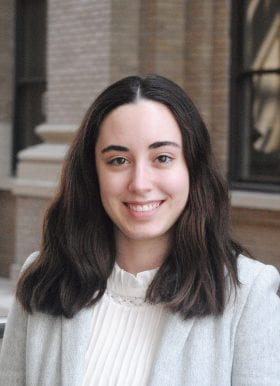
Amanda Cimino
My experience in St. Louis biotech: moving research from bench to bedside
By: Amanda Cimino (McKelvey School of Engineering – Biomedical Engineering, 4th year PhD candidate)
During the summer before I went to high school, I came across the field of regenerative medicine by chance while reading a science fiction book assigned for summer read. Although the plot of the book was entirely fictional, there were snippets from real news articles throughout the book, one of which was titled “3D printing with stem cells could lead to printable organs.” Pausing to confirm that the article was real, I began to wonder where the line between science fiction and cutting-edge research was. That initial curiosity remained in the back of my mind, leading me on a path to biomedical engineering. As I learned more about what research really was as an undergrad and then as a grad student, it still seemed like such a leap to go from “bench to bedside.” To find out how research really makes an impact, I wanted to learn about the next step beyond what we often do in academia – commercialization, so I joined the Pivot 314 Program.
I had the opportunity to work at an early-stage biotech company called GenAssist. GenAssist is working on technology that helps restore muscle after injury using specially designed materials and tissue engineering to help patients that may otherwise face lifelong disability. I was thrilled to find a company in St. Louis whose goals were in line with my interests and experience. Although the research was quite different than what I was doing for my PhD, I was eager to see how I could apply what I knew to solve different problems.

One the most interesting things that I learned during the internship was about how my training was more broadly applicable than I realized. After working for a few years on my PhD project, it was energizing to focus on new methods. I was surprised by how many of the basic skills translated into a different field. I had heard that a PhD is most valuable for learning how to think and solve problems, and this experience has helped me better understand what that means and feel more confident in the next steps after my PhD.
Beyond the research, I had the opportunity to try out several other aspects of running a business, from reviewing FDA documents to making pitch decks. One of the best parts of interning at an early-stage start-up was the diversity of roles that I could help fill. Instead of having a single task, I was able to experience what different positions in biotech may be like. This was incredibly useful in figuring out what types of careers I would be interested in exploring more. Overall, the experience was great, with the 10 weeks flying by, and I felt like I got to see how science can begin to move from fiction to reality.